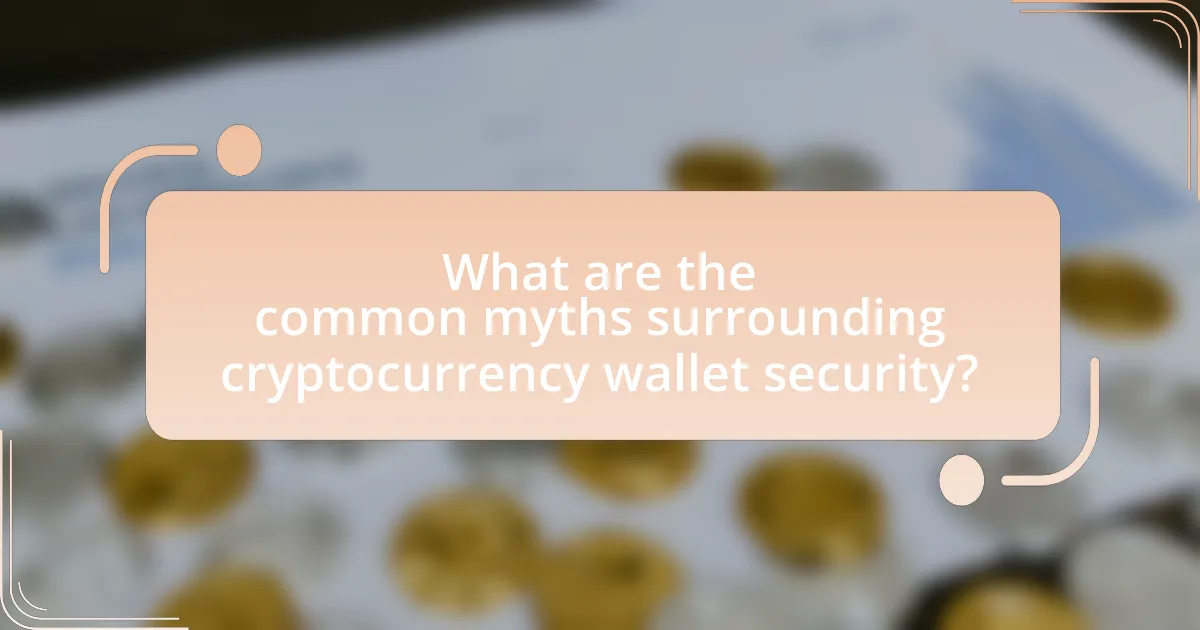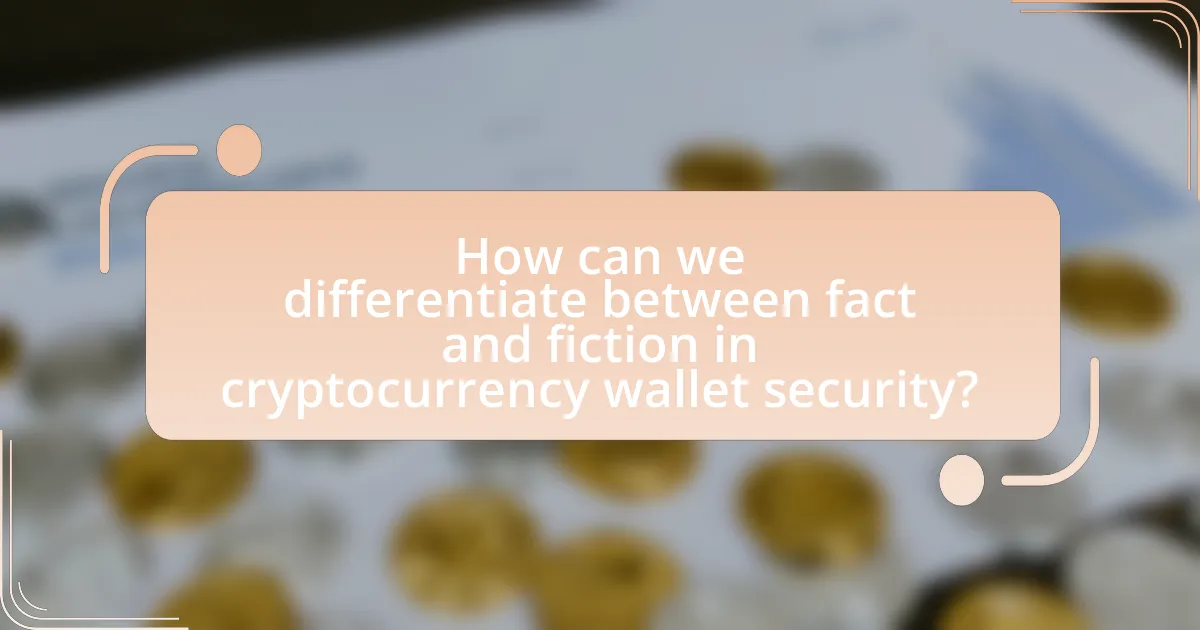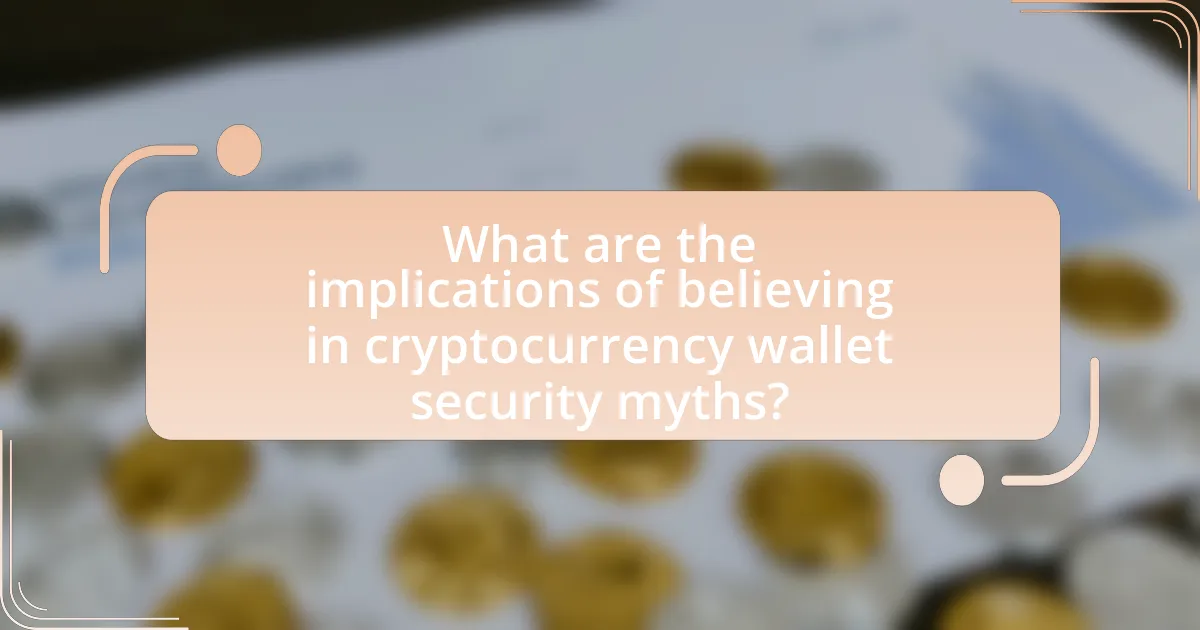The article “Cryptocurrency Wallet Security Myths Debunked” addresses prevalent misconceptions regarding the security of cryptocurrency wallets. It clarifies that hardware wallets, while more secure, are not immune to hacking, and that not all software wallets are inherently insecure. The piece emphasizes the risks associated with storing cryptocurrency on exchanges and highlights the importance of understanding wallet security to prevent financial losses. Additionally, it discusses the psychological factors contributing to the spread of misinformation and outlines best practices for users to enhance their wallet security, including the use of strong passwords, two-factor authentication, and regular software updates.

What are the common myths surrounding cryptocurrency wallet security?
Common myths surrounding cryptocurrency wallet security include the belief that hardware wallets are completely immune to hacking, that all software wallets are insecure, and that storing cryptocurrency on exchanges is safe. Hardware wallets, while more secure than software wallets, can still be compromised if users do not follow best practices, such as keeping recovery phrases private. Not all software wallets are insecure; many reputable options offer strong security features. Additionally, storing cryptocurrency on exchanges exposes users to risks, as exchanges can be hacked or may engage in fraudulent practices. According to a report by Chainalysis, over $1.9 billion was stolen from exchanges in 2020, highlighting the vulnerabilities associated with exchange storage.
Why do people believe these myths?
People believe these myths due to a combination of misinformation, lack of understanding, and the complexity of cryptocurrency technology. Misinformation often spreads through social media and forums, where unverified claims can gain traction quickly. Additionally, many individuals lack a foundational knowledge of how cryptocurrency wallets function, leading to misconceptions about their security. For instance, a survey by the Cambridge Centre for Alternative Finance found that only 25% of respondents understood the basic principles of cryptocurrency security, highlighting the gap in knowledge that contributes to the persistence of these myths.
What psychological factors contribute to the spread of misinformation?
Cognitive biases significantly contribute to the spread of misinformation. These biases, such as confirmation bias, lead individuals to favor information that aligns with their pre-existing beliefs while disregarding contradictory evidence. For instance, a study published in the journal “Psychological Science” by Lewandowsky et al. (2012) highlights how people are more likely to accept misinformation that confirms their views, which can perpetuate false narratives. Additionally, the Dunning-Kruger effect causes individuals with limited knowledge to overestimate their understanding, making them more susceptible to sharing inaccurate information. This combination of cognitive biases creates an environment where misinformation can thrive, particularly in contexts like cryptocurrency, where technical details may be misunderstood or misrepresented.
How does the complexity of cryptocurrency contribute to misunderstandings?
The complexity of cryptocurrency contributes to misunderstandings by creating barriers to comprehension for users unfamiliar with its technical aspects. Many individuals struggle with concepts such as blockchain technology, cryptographic security, and decentralized finance, leading to misinterpretations of how cryptocurrencies function. For instance, a 2021 survey by the Financial Industry Regulatory Authority found that 66% of Americans could not correctly define cryptocurrency, highlighting a significant knowledge gap. This lack of understanding can result in poor investment decisions, susceptibility to scams, and an overall mistrust of the technology.
What are the most prevalent myths about cryptocurrency wallet security?
The most prevalent myths about cryptocurrency wallet security include the belief that hardware wallets are completely immune to hacks, that all software wallets are insecure, and that using a wallet guarantees the safety of funds. Hardware wallets, while more secure than software wallets, can still be compromised if users do not follow best practices, such as keeping their recovery phrases safe. Not all software wallets are insecure; many reputable options employ strong encryption and security measures. Additionally, simply using a wallet does not ensure safety; users must also implement security measures like two-factor authentication and regular software updates to protect their assets.
Is it true that hardware wallets are completely immune to hacks?
Hardware wallets are not completely immune to hacks. While they provide a high level of security by storing private keys offline, vulnerabilities can still exist, such as supply chain attacks, malware on the host device, or physical theft. For instance, in 2020, a vulnerability was discovered in certain hardware wallets that could allow attackers to extract private keys if the device was compromised. Therefore, while hardware wallets significantly reduce the risk of hacking compared to online wallets, they are not infallible.
Do software wallets always compromise security?
Software wallets do not always compromise security. While they are generally considered less secure than hardware wallets due to their connection to the internet, many software wallets implement strong encryption, two-factor authentication, and other security measures to protect user funds. For instance, reputable software wallets like Exodus and Electrum have built-in security features that enhance protection against unauthorized access. Therefore, the level of security in software wallets largely depends on the specific wallet’s design and the user’s security practices.
Can cryptocurrency exchanges guarantee the safety of your funds?
Cryptocurrency exchanges cannot guarantee the safety of your funds. While many exchanges implement security measures such as two-factor authentication and cold storage, they remain vulnerable to hacks and breaches. For instance, in 2014, Mt. Gox, a major exchange, lost approximately 850,000 Bitcoins due to a security breach, highlighting the risks involved. Additionally, the lack of regulatory oversight in many jurisdictions further complicates the assurance of fund safety. Therefore, users should exercise caution and consider using personal wallets for enhanced security.

How can we differentiate between fact and fiction in cryptocurrency wallet security?
To differentiate between fact and fiction in cryptocurrency wallet security, one must analyze credible sources and verify claims through established security practices. For instance, reputable cybersecurity organizations like the Cybersecurity & Infrastructure Security Agency (CISA) provide guidelines on securing wallets, emphasizing the importance of private key management and the use of hardware wallets for enhanced security. Additionally, examining peer-reviewed studies, such as those published in the Journal of Cybersecurity, can clarify misconceptions about wallet vulnerabilities and the effectiveness of various security measures. By cross-referencing information from these authoritative sources, individuals can discern factual information from misleading narratives in the cryptocurrency space.
What are the key indicators of a secure cryptocurrency wallet?
The key indicators of a secure cryptocurrency wallet include strong encryption, two-factor authentication (2FA), and a clear backup and recovery process. Strong encryption protects the wallet’s private keys, making it difficult for unauthorized users to access funds. Two-factor authentication adds an extra layer of security by requiring a second form of verification, such as a text message or authentication app, before allowing access. A clear backup and recovery process ensures that users can restore their wallets in case of loss or theft, which is crucial for maintaining access to their assets. These features collectively enhance the security of a cryptocurrency wallet, reducing the risk of theft and loss.
How do encryption and private keys enhance wallet security?
Encryption and private keys significantly enhance wallet security by ensuring that only authorized users can access their cryptocurrency. Encryption transforms sensitive data into a format that is unreadable without the correct decryption key, protecting wallet information from unauthorized access. Private keys, which are unique cryptographic keys associated with each wallet, serve as a secure means of authorizing transactions. If a private key is kept confidential, it prevents others from accessing the wallet and executing transactions without the owner’s consent. According to a report by the Blockchain Research Institute, the use of strong encryption and secure key management practices can reduce the risk of theft and fraud in cryptocurrency transactions.
What role does two-factor authentication play in securing wallets?
Two-factor authentication (2FA) significantly enhances the security of wallets by requiring two forms of verification before granting access. This additional layer of security mitigates the risk of unauthorized access, as even if a password is compromised, the attacker would still need the second factor, typically a code sent to a mobile device or generated by an authentication app. According to a study by Google and the University of California, Berkeley, 2FA can block 100% of automated bots and 96% of bulk phishing attacks, demonstrating its effectiveness in protecting sensitive information, including cryptocurrency wallets.
How can users protect themselves from common security myths?
Users can protect themselves from common security myths by educating themselves on accurate information regarding cryptocurrency wallet security. Understanding that not all wallets are equally secure, users should research the differences between hot wallets and cold wallets, recognizing that cold wallets provide enhanced security against online threats. Additionally, users must be aware that using strong, unique passwords and enabling two-factor authentication significantly reduces the risk of unauthorized access. According to a study by the Cybersecurity & Infrastructure Security Agency, 80% of data breaches involve weak or stolen passwords, highlighting the importance of robust security practices. By staying informed and adopting these measures, users can effectively mitigate the risks associated with prevalent security myths.
What best practices should users follow for wallet security?
To ensure wallet security, users should implement strong passwords, enable two-factor authentication (2FA), and regularly update their software. Strong passwords should be complex, combining letters, numbers, and symbols, making them difficult to guess. Two-factor authentication adds an extra layer of security by requiring a second form of verification, significantly reducing the risk of unauthorized access. Regular software updates are crucial as they often include security patches that protect against vulnerabilities. According to a report by the Cybersecurity & Infrastructure Security Agency, using 2FA can prevent 99.9% of automated attacks, highlighting its effectiveness in enhancing wallet security.
How can users stay informed about the latest security threats?
Users can stay informed about the latest security threats by regularly following reputable cybersecurity news websites, subscribing to threat intelligence feeds, and participating in online forums focused on cybersecurity. Reputable sources such as Krebs on Security and the Cybersecurity & Infrastructure Security Agency (CISA) provide timely updates on emerging threats. Additionally, threat intelligence platforms like Recorded Future offer insights into vulnerabilities and attacks, while community forums such as Reddit’s r/cybersecurity allow users to share experiences and knowledge. Engaging with these resources ensures users remain aware of the evolving landscape of security threats.

What are the implications of believing in cryptocurrency wallet security myths?
Believing in cryptocurrency wallet security myths can lead to significant financial losses and increased vulnerability to cyber threats. For instance, misconceptions such as the belief that hardware wallets are completely immune to hacking can result in users neglecting essential security practices, leaving their assets exposed. According to a report by Chainalysis, in 2021 alone, over $7.7 billion was lost to cryptocurrency theft, much of which stemmed from users falling prey to security myths. Furthermore, these myths can foster a false sense of security, causing individuals to underestimate the importance of regular software updates and strong password practices, ultimately compromising their wallet security.
How can misconceptions lead to financial loss?
Misconceptions can lead to financial loss by causing individuals to underestimate risks associated with cryptocurrency wallets. For instance, believing that all wallets are equally secure can result in users storing significant amounts of cryptocurrency in less secure options, such as online wallets, which are more susceptible to hacking. According to a report by Chainalysis, over $1.9 billion was stolen from cryptocurrency exchanges and wallets in 2020 alone, highlighting the financial repercussions of inadequate security awareness. Furthermore, misconceptions about the irreversibility of transactions can lead to irreversible losses when users fall victim to scams or phishing attacks, as they may not take necessary precautions to verify the legitimacy of transactions.
What are the risks of using insecure wallets?
Using insecure wallets exposes users to significant risks, including theft of funds, loss of access to assets, and data breaches. Insecure wallets often lack robust encryption and security measures, making them vulnerable to hacking attempts. For instance, a study by Chainalysis in 2021 revealed that over $7.7 billion worth of cryptocurrency was stolen through hacks, many of which targeted insecure wallets. Additionally, users may fall victim to phishing attacks that exploit weak wallet security, leading to unauthorized transactions and loss of funds. These risks highlight the importance of using secure wallets to protect digital assets effectively.
How can misinformation affect the overall cryptocurrency market?
Misinformation can significantly destabilize the overall cryptocurrency market by influencing investor behavior and market sentiment. For instance, false claims about a cryptocurrency’s security vulnerabilities can lead to panic selling, resulting in sharp price declines. A notable example occurred in 2018 when rumors about a major exchange being hacked caused a temporary market crash, erasing billions in value. Additionally, misleading information regarding regulatory changes can create uncertainty, prompting investors to withdraw funds or halt investments, further exacerbating market volatility. Thus, the spread of misinformation directly impacts market dynamics and investor confidence in cryptocurrencies.
What steps can users take to ensure their cryptocurrency wallet security?
To ensure their cryptocurrency wallet security, users should implement strong passwords, enable two-factor authentication (2FA), and regularly update their wallet software. Strong passwords reduce the risk of unauthorized access, while 2FA adds an additional layer of security by requiring a second form of verification. Regular software updates are crucial as they often include security patches that protect against vulnerabilities. According to a report by the Cybersecurity & Infrastructure Security Agency, 80% of data breaches could be prevented with proper security measures, highlighting the importance of these steps in safeguarding cryptocurrency assets.
What tools and resources are available for enhancing wallet security?
To enhance wallet security, users can utilize hardware wallets, software wallets with strong encryption, two-factor authentication (2FA), and secure backup solutions. Hardware wallets, such as Ledger and Trezor, store private keys offline, significantly reducing the risk of hacking. Software wallets like Exodus and Electrum offer encryption and user-friendly interfaces, while 2FA adds an extra layer of security by requiring a second form of verification. Additionally, secure backup solutions, including encrypted cloud storage or physical backups, ensure that users can recover their wallets in case of loss or theft. These tools collectively provide robust protection against unauthorized access and potential loss of funds.
How can users effectively manage their private keys?
Users can effectively manage their private keys by utilizing hardware wallets, employing strong password protection, and regularly backing up their keys. Hardware wallets, such as Ledger or Trezor, store private keys offline, significantly reducing the risk of online hacks. Strong password protection involves creating complex, unique passwords for wallet access, which can prevent unauthorized access. Regular backups ensure that users can recover their keys in case of device loss or failure, with best practices recommending multiple secure storage locations. According to a report by the Blockchain Security Alliance, 90% of cryptocurrency thefts occur due to poor key management, highlighting the importance of these strategies in safeguarding assets.
What are the best practices for maintaining cryptocurrency wallet security?
The best practices for maintaining cryptocurrency wallet security include using hardware wallets, enabling two-factor authentication, regularly updating software, and keeping private keys confidential. Hardware wallets, such as Ledger or Trezor, store cryptocurrencies offline, significantly reducing the risk of hacking. Two-factor authentication adds an extra layer of security by requiring a second form of verification, making unauthorized access more difficult. Regular software updates ensure that any vulnerabilities are patched, protecting against potential exploits. Keeping private keys confidential is crucial, as exposure can lead to theft; users should never share their keys and should consider using a secure password manager for storage. These practices are supported by cybersecurity experts who emphasize the importance of layered security measures in protecting digital assets.